Welcome back, film score lovers! It’s crazy that it’s already been two weeks since the last CS Score, but that’s how time operates in this very strange time we live in. Fret not, we’ve got some fun film score goodies for you to check out. First, we’re gonna offer you a sneak peak at the upcoming score to Apple TV’s Tiny World from composer Benjamin Wallfisch and Chris Egan, followed by a review of David Buckley’s score to the action disaster flick Greenland; and we’ll wrap it all up with a terrific interview with composer Genevieve Vincent, who was kind enough to sit down with us to discuss her score for Natalie Krinsky’s The Broken Hearts Gallery.
Read!
LISTEN TO A TRACK FROM TINY WORLD
BY BENJAMIN WALLFISCH
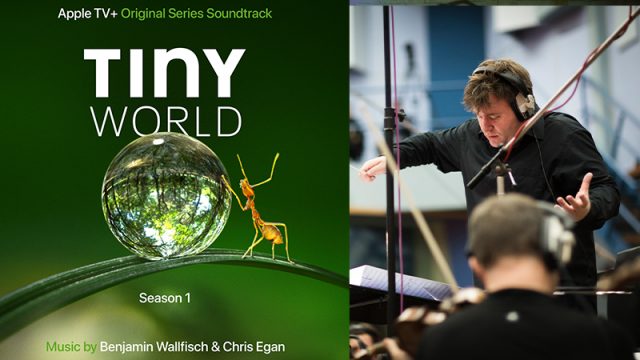
Check out this track from Apple TV’s Tiny World titled “Nightfall!” Composed by Benjamin Wallfisch (It, Blade Runner 2049) and Chris Egan, the score’s lush orchestrations provide a dazzling backdrop to the idiosyncratic dramas of the extraordinary creatures in the docuseries. Tiny World will premiere globally on October 2, exclusively on Apple TV+, and Lakeshore Records will release the album digitally exclusively on Apple Music on the same day. The album will be released digitally on all other platforms on November 6.
Pre-order the album here.
GREENLAND
BY DAVID BUCKLEY
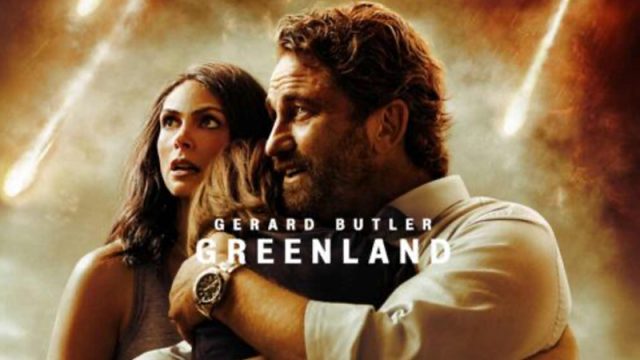
Those who have seen the trailer for Ric Roman Waugh’s Greenland will likely admit the film looks like a carbon copy of disaster flicks like 2012, Geostorm, and The Day After Tomorrow. You know, the straight-faced, special FX driven wanna-be epics Hollywood seemingly produces in batches? Such films are enjoyable in terms of sheer spectacle, but typically leave a lot to be desired when it comes to plotting, characters and logic. Of course, that hasn’t stopped HBO from shelling out quite a bit of dough for the feature, which will skip theaters and land on digital platforms sometime in the fourth quarter. And it must be said that, amidst the pandemic, a film of this size and scale would certainly be welcomed with open arms by a public starving for new content.
Perhaps that’s one of the reasons why I dug David Buckley’s score to Greenland. No, the soundtrack doesn’t offer anything new and indeed apes previous scores from the genre, especially David Arnold’s The Day After Tomorrow and Andrew Lockington’s San Andreas — to say nothing the score’s very Zimmer-esque overall design — but there is enough here to keep soundtrack-starved listeners engaged for roughly 56 minutes.
Listeners will note the downbeat nature of the score and its reliance on electronic instruments and synths during more robust moments such as the tracks “First Shockwave” and “Things Fall Apart.” Buckley occasionally mixes in drum beats (ala Tom Kolkenborg’s Mad Max: Fury Road) to great effect and layers it all with splashes of dramatic synth choir. Juxtaposed against these more bombastic moments are quieter tracks like the electric guitar heavy “Imperfect Lives” and the emotionally charged “Reunited,” both of which call to mind Steve Jablonsky’s score for Lone Survivor. Again, nothing about Greenland is particularly unique — one might even call it quite generic. But it’s not bad, either. The album is simply good. And that’s it.
Other highlights include the tracks “Molten Rain,” a lengthy, action-packed cue that blends all elements of the score into one entertaining piece; and “Brave New World,” which is, perhaps, the best cue on the album and the one track you’ll likely hear played endlessly on radio stations and YouTube channels — right behind Zimmer’s “Time” from Inception.
There’s not much to say about Greenland. The tracks are mostly repetitive and overtly simplistic with few exciting flourishes. Yet, it’s still a solid score with enough high points to warrant a listen or two. It won’t knock your socks off, but you can do far worse.
Purchase Greenland (Original Motion Picture Soundtrack) here!
INTERVIEW WITH THE BROKEN HEARTS GALLERY COMPOSER GENEVIEVE VINCENT
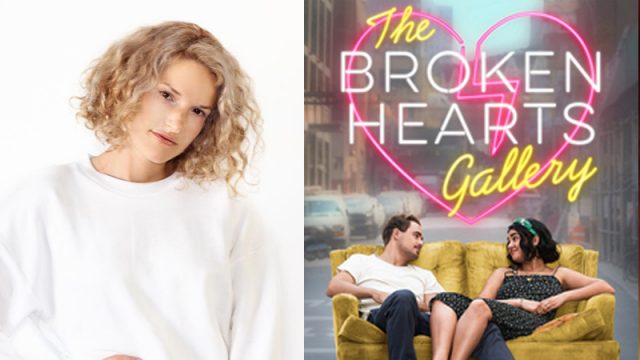
Genevieve Vincent’s recent projects include Moving Art “Hokkaido” for Netflix for which she wrote a Japanese inspired orchestral hybrid score; and the National Film Board of Canada documentaries Because We Are Girls, which premiered at the Hot Docs International Documentary Festival in 2019, and Now Is The Time, which premiered at The Toronto International Film Festival in 2019, screened at The Sundance Film Festival in 2020.
In addition to her film credits, Vincent comprises half of the electronic-pop duo darkDARK, which is signed to Nettwerk records. darkDARK’s debut EP “Heathered” has been featured on NPR’s All Songs Considered, Noisey, and Consequence of Sound, among other notable outlets. On July 31st 2020 they released a follow up EP “We Forget When We’re Apart” which has been a playlist favorite on Apple Music.
The Broken Hearts Gallery follows the always unique Lucy, a 20-something art gallery assistant living in New York City, who also happens to be an emotional hoarder. After she gets dumped by her latest boyfriend, Lucy is inspired to create The Broken Heart Gallery, a pop-up space for the items love has left behind. Word of the gallery spreads, encouraging a movement and a fresh start for all the romantics out there, including Lucy herself.
The film will be led by Geraldine Viswanathan (Blockers, Bad Education) and Dacre Montgomery (Power Rangers, Stranger Things). It will also feature Molly Gordon (Booksmart), Suki Waterhouse (Love Rosie), Utkarsh Ambudkar (Blindspotting), Phillipa Soo (Hamilton), Arturo Castro (The Informer), Bernadette Peters (Pennies from Heaven), Ego Nwodim (Saturday Night Live), and model Taylor Hill.
RELATED: The Broken Hearts Gallery Trailer: There’s An Art to Letting Go
The Broken Hearts Gallery is written and directed by Natalie Krinsky. It is executive produced by Selena Gomez, Mandy Teefey, Jesse Shapira, Jeff Arkuss, Josh Clay Phillips, Mason Novick, and Michelle Knudsen.
Purchase The Broken Hearts Gallery here!
ComingSoon.net: How did you get involved with The Broken Hearts Gallery?
Vincent: So I created some music on a pitch to the music supervisor production company, and they ended up getting in touch with me after a couple of months. I think it was something like that, and asked me if I would want to read the script. And so, I was obviously like, oh my god, this is crazy. Of course I want to read the script. And so, I was like, what’s happening? So I read the script and I totally fell in love with it. It’s super relatable and so funny and the humor is so spot on for the characters. I mean, I spent five years in New York in my early 20’s, so I was like, oh, this is 100 percent spot on. And so, I really enjoyed it. And then, I did a demo for that and Natalie liked it and picked me.
CS: You’ve done a lot of documentaries and short films, but this is the first feature film you’ve done. How is it different than the other projects you’ve done?
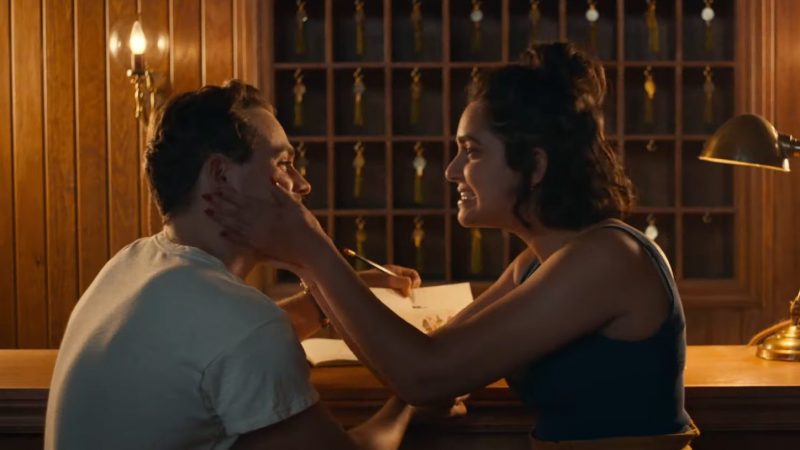 Vincent: It’s just different. I think every project is a puzzle and everyone is different. I mean, I think whether it’s a fictional story or a documentary, I mean, every film is a story. So to me it’s sort of like, about getting into the experience of the characters in the film, and then finding out from the director like exactly how they want the audience to experience the film, the atmosphere that the characters are in, and then basically trying to really like, translate that musically. And I think yeah, I find the process, well, like every single thing I work on has been different. I find that the process of getting into sort of the empathy of empathizing with the character, the scene and their life, their moods and stuff is the same. So yeah, so I think that that storytelling process is the through line between all the projects.
Vincent: It’s just different. I think every project is a puzzle and everyone is different. I mean, I think whether it’s a fictional story or a documentary, I mean, every film is a story. So to me it’s sort of like, about getting into the experience of the characters in the film, and then finding out from the director like exactly how they want the audience to experience the film, the atmosphere that the characters are in, and then basically trying to really like, translate that musically. And I think yeah, I find the process, well, like every single thing I work on has been different. I find that the process of getting into sort of the empathy of empathizing with the character, the scene and their life, their moods and stuff is the same. So yeah, so I think that that storytelling process is the through line between all the projects.
CS: If I had to describe the score, I would call it hopeful. It feels like there’s an element of sadness in there as well, but it also has a very kind of hopeful tune, which I think fits in with the theme of the film. Was that by design?
Vincent: Yeah. No, I mean, you totally nailed it. I think the film is really hopeful. And I think the music, I tried to sort of follow Lucy. I mean, the music I think really does — it’s sort of like Lucy’s like, theme song kind of, sort of like the film centers around her and it’s from her perspective. And the music is kind of also, I think. I mean, at least I tried to sort of do that. And so, I think her optimism — I mean, obviously she has her ups and downs in the movie. But her optimism shines through, you know, everything as well as her unwillingness to give up. The music is supposed to amplify that part of her personality.
CS: This is a soundtrack bursting with ideas. The tracks “Knight in Shining Armor” and “Let Go” really stood out to me. But I also wouldn’t call it a traditional romantic comedy score. So how did you avoid the traditional beats of other films?
Vincent: Yeah, so you mentioned I’ve done the TV stuff, and I did do a few rom com TV things. I think what I find is there are tropes that are important to follow in that genre, like timing things. So you know, like we have a score around a joke and make sure that the joke lands and try not to get in the way of the humor and how not to kind of, you know, step on things. And I think that’s something that’s definitely important to use in terms of design, I think designing the music. And as far as like, that sort of like, writing the themes and all that stuff, and I think yeah, I think I just try to sort of focus on just making something that is a reflection of the film. And the film is not like, I mean, you can compare. Everything has comparisons, but you know, the film is its own unique project, and so if I’m really sort of reflecting what I’m getting from the film back to the film musically, it’s not going to sound like other things because the film isn’t giving me something that’s been done before, the same way that something else has been done. So yeah, I think reflecting that originality back at it. If that makes sense?
CS: No, it does. I think it’s great. Is there a moment where you accidentally stumble on some unique idea and either cart it away for future use or you like employ it for the project at hand?
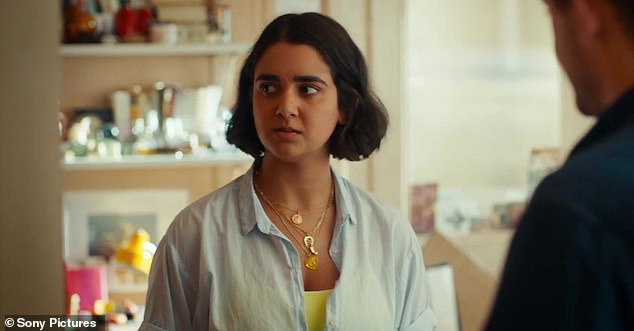 Vincent: Yeah, for sure. Yeah, I mean, especially with synths and stuff, I’m always fiddling around with synths, and also VOX stuff. And yeah, I’m always finding weird sounds. And sometimes I’m like, oh this is awesome. And I have a band and sometimes when I find something cool, I’ll just like, write a song based on that and just like, talk in the song or send it over to my bandmate or something. But so I’m always writing music on my own. And so, I’m always sort of fiddling around and discovering things. And I’ll go ahead and like, go down the road and write a piece of music just for no reason, just for myself because I enjoy it. And yeah, I mean, it’s nice. The cool thing is when you find something cool and you actually can squeeze it into a film. But yeah.
Vincent: Yeah, for sure. Yeah, I mean, especially with synths and stuff, I’m always fiddling around with synths, and also VOX stuff. And yeah, I’m always finding weird sounds. And sometimes I’m like, oh this is awesome. And I have a band and sometimes when I find something cool, I’ll just like, write a song based on that and just like, talk in the song or send it over to my bandmate or something. But so I’m always writing music on my own. And so, I’m always sort of fiddling around and discovering things. And I’ll go ahead and like, go down the road and write a piece of music just for no reason, just for myself because I enjoy it. And yeah, I mean, it’s nice. The cool thing is when you find something cool and you actually can squeeze it into a film. But yeah.
CS: Woa! You have a band? You’ve got to tell us a little bit about that.
Vincent: I have this duo called darkDARK which is me and my bandmate Chris James. And we are an electronic kind of dark pop duo. We also produce music for other artists and we have a couple of really cool collaborations on our new record that’s coming out on Nettwerk. We produced this sort of like, cloud hip hop track and collaborated with this rapper, Leonis. We’ve got all kinds of stuff out. We’ve done two EPs and we’re just kind of enjoying putting out music for the love of it.
CS: That’s awesome!
Vincent: Yeah, and it informs the film scoring process for me because I’m always fiddling around with stuff and writing songs, yeah, with no pressure, I then learn all these things and then when I get a film, I’m like, oh cool. I can apply this new skill that I learned or I can, yeah, put this in there, try that.
CS: What are some of the things you have learned over the years in your career?
Vincent: I think I’ve definitely learned to stay out of the way of the dialogue better. Yeah, the first few films — well, actually, the very first film that I scored, there was no dialogue. It was literally just a short film and it was just animation and music. So that was a bit of a precedent because I was like, oh, this is great. Look at all this space I have. But yeah, and then my first documentary I did with the same filmmaker, and there was a lot of dialogue because that’s documentary style. And I think it was a little while for me to kind of like, figure out like, how do I make the right instrumentation that like, sits below the dialogue and still have music going? And yeah, I think that’s definitely something I feel like I’ve mastered pretty well since then.
The other thing that I really like just, yeah, makes me so grateful for doing the TV movies is the comedic timing thing. I mean, I didn’t really understand it at first, and then after doing a few of those things I was like, oh. That’s how it works. You know, I started to learn how to do it on the first one. You just kind of keep trying to like, make things land better. And by the time I did Broken Hearts Gallery, you know, it’s the best compliment ever was that Shawn Paper the editor told me that I had good timing.
CS: Oh that’s cool.
Vincent: It was awesome because he’s been in the business forever and he’s got all these amazing credits under his belt.
CS: What do you think is a film composer’s overall job for a film?
Vincent: What’s the composer’s overall job for a film? I mean, I think it’s just to amplify the vision of the director and I think that like, I think the more that you sort of develop as an artist, the more that you’re able to like, do that in a special way for them. You know, because it’s obviously, it’s going to be through your own voice. So I think it’s not just being like conduit, but it’s kind of like being a mirror because you need to sort of create I think — well, at least for me, the way I approach it is like, I want to create the right shape that fits like a puzzle piece in with the film. And you know, I want it to be heard when it makes sense for it to be heard. I want it to support when it makes sense to support. And I want to kind of have a seamless experience for the viewer that feels like really emotional in the right way, and it really compliments the original vision of the director.
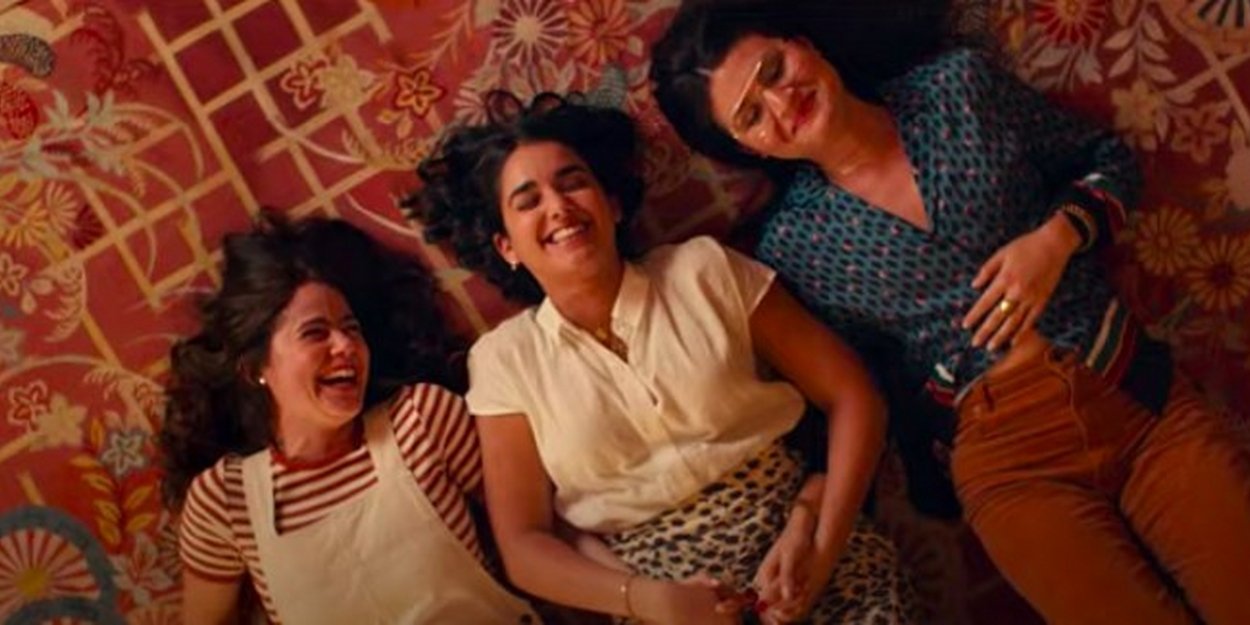 CS: Who are some of the people that influenced you?
CS: Who are some of the people that influenced you?
Vincent: I mean, I don’t think — I try not to mimic other people’s styles. I definitely try to perform in my own voice as much as I can. But I really admire and love the work of Philip Glass. I really admire and love the work of Max Richter. I really love the work of Johann Johannsson and [Hildur Guðnadóttir], who just scored Joker.
CS: Yeah!
Vincent: So yeah, so she’s incredible and I loved her score in Chernobyl. I think and then going back to sort of the old greats, you know, Bernard Hermann, I absolutely love the harmonies he uses, especially in Vertigo. That was incredible. And other than that, I listen to a lot of hip hop, a lot of top 40, a lot of electronic music. I mean, I love really good songwriters like Taylor Swift. I think I just kind of like, I’m really into all of it. I’m a huge music consumer. And yeah, I mean, I love 90s grunge, The Smashing Pumpkins and Nirvana and Sound Garden. You know? All of it. Name it, I’m probably like, yeah, some part of it is cool.
CS: What’s it like to sit down, you turn on a TV show or a movie and you hear your music in there?
Vincent: It’s funny. I have had both experiences. Like it depends on how much excitement builds up before. I love seeing it in a theater, because the music is never going to sound better than in the theater. I mean, maybe in the mix it will sound it’s absolute best, but the theater is where it’s meant to play. So I love seeing it in a theater because that feels like the full circle like, yeah, like we did it.
CS: Do you have any other projects that you’re working on right now that you’re excited to talk about or that you’re allowed to talk about?
Vincent: Yeah, I am really excited to talk about a project that I’m not allowed to talk about. But I will say coming up is a thriller. It’s a synth-based score and it’s absolutely just aggressive. And I’m so excited. It’s the most manic thing I’ve ever written and you know, I think it’ll just give people a lot of anxiety in the best possible way. So I’m very excited for that.










